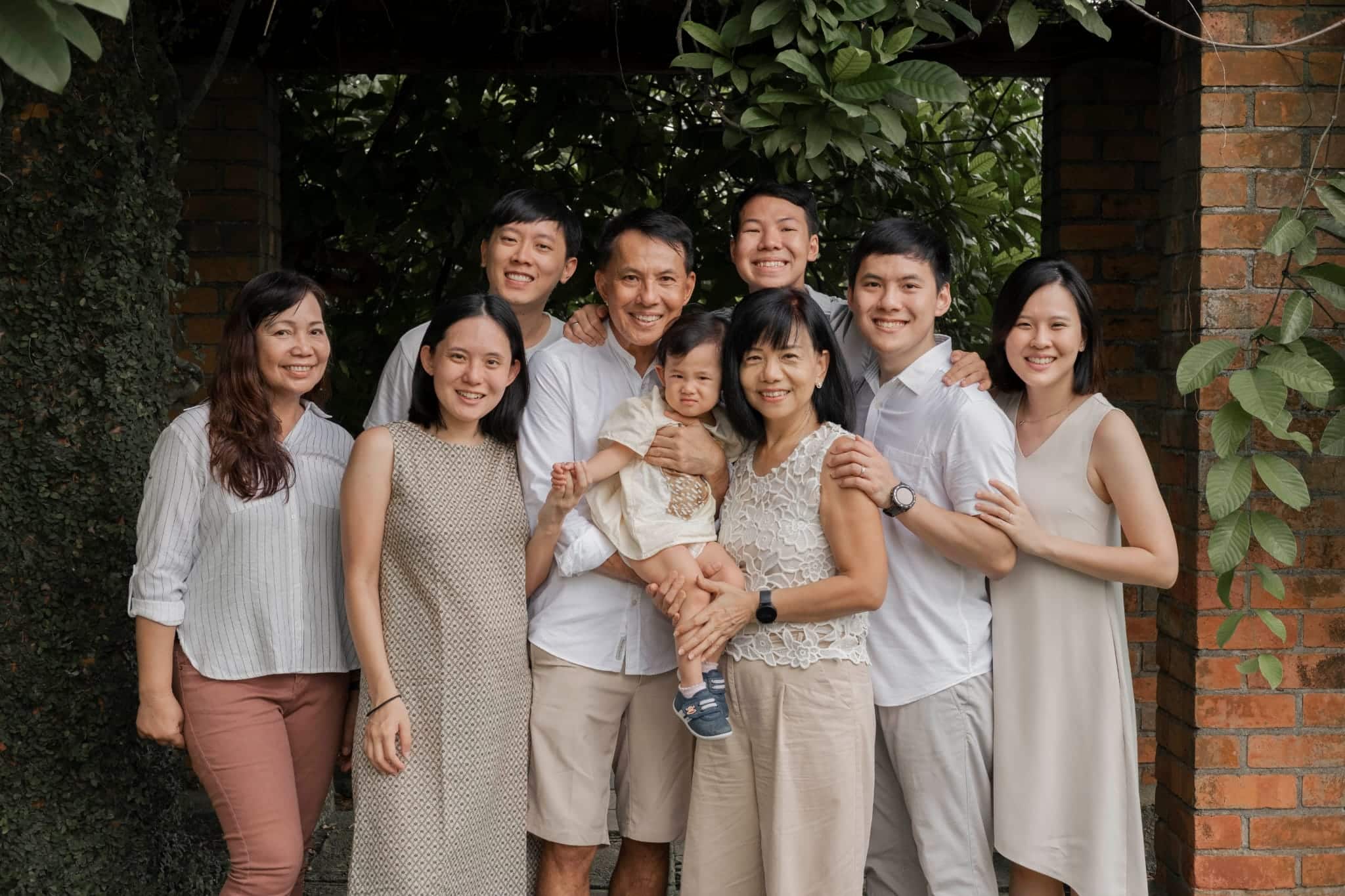“Help! My mother-in-law disciplined my child by slapping her”: Salt&Light Family Night on how to navigate this and other in-law issues
by Christine Leow // September 20, 2022, 4:05 pm

"How much space should we give our adult children and their spouses? How can I trust my children with my in-laws when our parenting styles differ?" Panellists tackled these thorny issues at Salt&Light Family Night. Photo by Oleksandr Pidvalnyi.
How do I get along with my in-laws? What if we have different values? How can I be a good in-law to my children’s spouse?
The questions asked on the episode of Salt&Light Family Night (August 30) that dealt with honouring our in-laws gave a glimpse into the challenges families face.
Nearly 100 people gathered over Zoom to hear the panellists – Theresa Tan and the Lims – share their stories and lessons learnt as they navigate relationships with their in-laws.
Theresa is a writer, editor, screenwriter and playwright with over three decades of creative editorial experience. Both her parents and her parents-in-law have lived with her and her husband at different times in their lives. She has three children aged 16 to 23.

Theresa Tan’s parents-in-law lived with her and her husband. She cared for them when they became ill. Photo courtesy of Theresa Tan.
Husband and wife Albert and Alison Lim are the national directors of Family Foundations Singapore, a faith-based agency that strengthens families. Married for 33 years, they have three children aged 25 to 31, two children-in-law, a young granddaughter as well as another grandchild on the way.
Over two-thirds (68%) of viewers did not live with their in-laws. They generally also had better relationships with their parents than with their in-laws. On a scale of 1 to 7, most (40%) rated their relationship with their parents a 5. When it came to in-laws, the largest percentage of viewers (34%) rated their relationship at 4.
What hindered a better relationship with their in-laws were the differences: different views, different values, personality clashes and distance.
Here’s how the panellists responded to commonly asked questions.
How can I get along with my in-laws?
1. Set boundaries
Albert talked about the biblical model of leaving and cleaving (Genesis 2:24) once a couple gets married.
Theresa took the initiative to create space between her mother and her family.
“The husband has to be the head of the household. You need to detach from your mum, your parents. You need to set boundaries,” he said.
When his parents lived with them, they “had incidents” even though Alison was thankful that her mother-in-law gave her plenty of freedom and never questioned her movements.
Said Albert: “Our roles as husband and wife, mother and father, we set it in motion and worked out the boundaries. That is important.”
For Theresa, while her husband’s parents gave the young family plenty of space, her own mother would drop by for a visit without notice.

Theresa Tan (right) with her children and parents-in-law. Her father-in-law has since passed away but her mother-in-law will return to live with her next year. Photo courtesy of Theresa Tan.
“It was harder for my husband.”
So, Theresa took the initiative to create space between her mother and her family by going abroad often.
2. Be candid
Open communication is vital. When Alison’s mother-in-law moved in with them, she was very candid.
“She told me, ‘I’m keeping my flat just in case one day we don’t get along.’ I was a bit shocked.
“But again, wah, she’s so honest. This means she trusts me enough to have this kind of conversation, which is not very Chinese,” said Alison.
“Whatever they do is out of love. So, see it from their point of view.”
Theresa had a similar experience with her own mother who helped her raise her son. Her mother would berate the floor when Theresa’s son fell down, something that did not go down well with Theresa.
“We had fights. My mum got so mad that she said, ‘Fine, you take back your son and look after him.’ She didn’t talk to me for three weeks. Then, I called her and said, ‘You miss my son, right?’ After that, we resumed.”
Theresa advocated “the art of speaking the truth in love”.
“Instead of holding it and not saying anything. Be prepared that they will be defensive.
“But whatever they do is out of love. So, see it from their point of view.”
3. Deal with your own parents
The Lims shared an incident when Albert’s mother disciplined their daughter, who was a bit cheeky, by slapping the child.
Said Alison, who worked as a social worker: “This was no good at all. It was going to damage her self-esteem, it was going to kill her character. I was so distraught, so upset. I didn’t know what to do.”

Albert and Alison Lim remained united in the face of challenges with in-laws, and that helped them with the issues they faced. Photo courtesy of the Lims.
Alison turned to her husband for help because she did not trust herself to speak to her mother-in-law while she was so emotional.
“I told him, ‘You tell your mum. She can discipline my daughter but not on the face.’”
He did. His mother never slapped her grandchildren again.
“I still respect you as my mum, but within the household, I love my wife. There are no two ways.”
Said Albert: “I told her, ‘Mum, we appreciate you looking after my daughter. But you can’t do this. This sort of thing is not in current practice.’
“When she disciplined me, she could do what she wanted when I was a child. But this was a different time and different space. I’m so glad she was kind enough to accept that.”
He was able to have such a difficult conversation with his mother because he always made sure she knew he loved her.
“That I asked them to live with me, they knew that I was filial and that I loved them. So, it was easy for me to bear my heart.”
He made sure his mother never felt that she was neglected simply because he had married. He would take her out to have her favourite meals on weekends.
“She knew, ‘my son still has mother in his heart.’ I still respect you as my mum, but within the household, I love my wife. There are no two ways.”
4. Have something in common
On the question of how to deal with mothers-in-law who perceived their daughters-in-law as not good enough for their sons, Alison suggested finding common ground over which to bond.

Now that they themselves are parents-in-law, Albert and Alison Lim (centre with child) are careful to cultivate good relationships with their children’s spouses. Photo courtesy of the Lims.
“My son says that if the son is the problem, the mother-in-law and the daughter-in-law will be very close.
“My daughter-in-law and I have a lot of conversations about my son. Both of us connect very well.”
5. Empathise with your in-laws
Alison believed that understanding the “different needs” of your in-laws can help bridge the gap.
“The main thing is to empathise. The way our parents were brought up affects who they are and what needs they have.
“They can’t give us what they don’t have. That empathy helps us appreciate them for who they are.”
She was blessed to have a mother-in-law who was very secure and raised her children to be unflappable. So, Albert is often unperturbed by criticisms.
“I was very attracted to the way my mother-in-law brought up my husband.”
How can I trust my children with my in-laws if we have different values?
The Lims experienced the challenges of having in-laws with values that differed from theirs when they invited Albert’s parents to live with them.
“There were some practices, like them insisting the baby wear clothes upside down when they came back from the hospital.
“You must look at your baby and say, ‘Ugly, ugly!’ even though it’s a pretty baby lest the gods take her. I couldn’t take it. Why did she say my baby is ugly?” said Alison.
1. Have a sense of humour
Eventually, Alison decided that she just had to “laugh it off” and not allow herself to be perturbed.
2. Set boundaries where it matters
But in things that are important to the Christian faith, Albert advised setting boundaries.
When his parents moved in with him, he asked that they not bring their ancestral altars with them.
Then, when his maternal grandmother came to visit and wanted to burn joss sticks, Albert had to set more boundaries. But he made some provisions because he knew the importance of “seeking to understand before you are understood”.
“I told my mum, ‘Can you tell her: whatever you want to do, please put it out of sight.’ I don’t have a perfect solution but at least I set as much boundaries as I can and not have this home open to unwanted practices.”
His grandmother agreed to pray at the back of the house.
2. Show Christian love
Alison’s mother-in-law was an extrovert who enjoyed being around Alison and Albert’s cell group when they gathered in their house.
“She became like their mother-in-law and grandmother to their children.”
She would cook for them and went on trips to Malaysia with them, and she got to experience “what Christian love was about”.
In the final two years of her life, when she was dying from cancer and her weight plummeted from 70kg to a mere 35kg, she allowed one of Alison and Albert’s church friends to visit and minister to her.
“Only in the last few weeks, she said, ‘I woke up one day, I think I saw Jesus. I want to be baptised.’
“To us, that was the greatest thing, to really know that my mother-in-law has been influenced by our Christian friends and that she is now safe with the Lord.”
3. Be aligned as a couple
If a wife is having difficulties with her mother-in-law, mutual support is important.
Said Alison: “It would be very sad for the wife to say, ‘I am facing this.’ and then the husband to say, ‘You deserve it, you didn’t treat my mother well.’
“The wife would feel so unsupported, abandoned, rejected.”
Instead, it would be helpful for the husband to stand by his wife.
4. Don’t be triggered
Alison also cautioned against allowing criticisms from the in-laws to speak to our insecurities.
“We need to ask God: ‘Where are our insecurities?’ and to ask Him to work on them.”
What if husband and wife are not in agreement?
Sometimes, conflicts with in-laws can strain a marriage. Among the questions asked was one about what to do when a husband decides to end the marriage.
Said Alison: “Working on the relationship is very, very key. Be able to have difficult conversations with open minds and open hearts.
“Don’t use language that blames or accuses. When you share your feelings, share your heart.”
Having a mentor or a support base is also important. Albert encouraged having a cell group or a pastor who can pray alongside you.
When Albert’s mother was on her deathbed, Alison was concerned that Albert was out playing golf instead of being with his mother.
A cell group where the men and women can gather separately may also allow the couple to share more freely about their difficulties.
One piece of advice the Lims gave to couples was to “spend time doing inner works”. Working out personal issues can help couples better relate to one another as well as to their children.
When Albert’s mother was on her deathbed, Alison was concerned that Albert was out playing golf instead of being with his mother.
“I was very angry with him for being an unfilial son. I was so angry. It created some tension between us.”
Because Albert refused to talk about it for two years, Alison did not know that Albert had refused to return because he was “contending with God”. He was bargaining with God to heal his mother.
“I was very angry with God,” he said.
That episode taught Albert to be open to be healed of life’s hurts. In a step towards clearing hurts, he has “taken the posture where there are times I will be there to wash the feet of my children”.
“I want to let them know that I am here to be a father, a father-in-law. If they need me, I will be around.”
How can we be good in-laws?
1. Appreciate our children-in-law
“Both our children-in-law are such gems. Our children have chosen well,” said Alison.
Once, when she was preparing a PowerPoint presentation and felt tired from working, she remembered her daughter-in-law who works long hours in the healthcare industry.
“But she is still so cheery. I have no reason to complain. I should be more like her. So, I told my son and he told her.
“She said, ‘I am so affirmed by what you are saying because I don’t always get so affirmed.’”
2. Show love
Albert, on the other hand, demonstrates his care through actions.
“I know my daughter-in-law loves durians. If I buy durians back for her, I let her know it’s for her.”
3. Set your own boundaries
When the Lims’ daughter first gave birth, the new grandparents were excited and wanted to visit the baby often.
“But my daughter was like, ‘If you come over to my place, you must ask permission.’ But I was her mother!
“I still need to let them be adults and run their own lives.”
“She was serious, so I took her seriously. This thing about boundaries came back. I had forgotten,” said Alison.
These days, although she has the code to enter her daughter’s house and would love to drop in to see her granddaughter on a whim, Alison does not.
“We need to give them that space. As much as I appreciated my mum-in-law for giving me the space, I want to give my children the space as well.”
Their son, who recently got married, is living with them. Alison is careful to respect his privacy.
“Last time, I would just go into his room. Now, Mummy must knock.”
Mindful that they now share a space with their adult son and daughter-in-law, the couple also informs them if they are having friends over.
“We let them know to see if it is appropriate or not to have our friends over,” said Albert.
Respecting their married children is their way of empowering them.
Added Albert: “It’s important to impart generational blessings to our children so they can hold their own ground with their own children.”
Already, their son is thinking of growing his family and having his parents involved.
“My son did tell me, ‘Mum, I don’t want you and Dad to age alone.’ And my daughter-in-law has come to me and said, ‘Mum, I would want you to be one of the major childminders of my children.’
“That is so appealing to me. But I still need to let them be adults and run their own lives,” said Alison.
4. Respect their family
Fostering good relations with your children-in-law’s parents is vital, too.
“We invite them to our place. Once you respect their parents, it is just another message of what love is like,” said Alison.
This report is Part 2 of the Salt&Light Family Night episode on How can I honour my in-laws? You can read Part 1 here.
A full recording of this episode will be posted on the Salt&Light YouTube channel at the end of the week. You can watch past episodes of Salt&Light Family Night on our YouTube channel here.
RELATED STORIES:
To my mother-in-law: Breathe easy now. It is well with our souls
We are an independent, non-profit organisation that relies on the generosity of our readers, such as yourself, to continue serving the kingdom. Every dollar donated goes directly back into our editorial coverage.
Would you consider partnering with us in our kingdom work by supporting us financially, either as a one-off donation, or a recurring pledge?
Support Salt&Light



